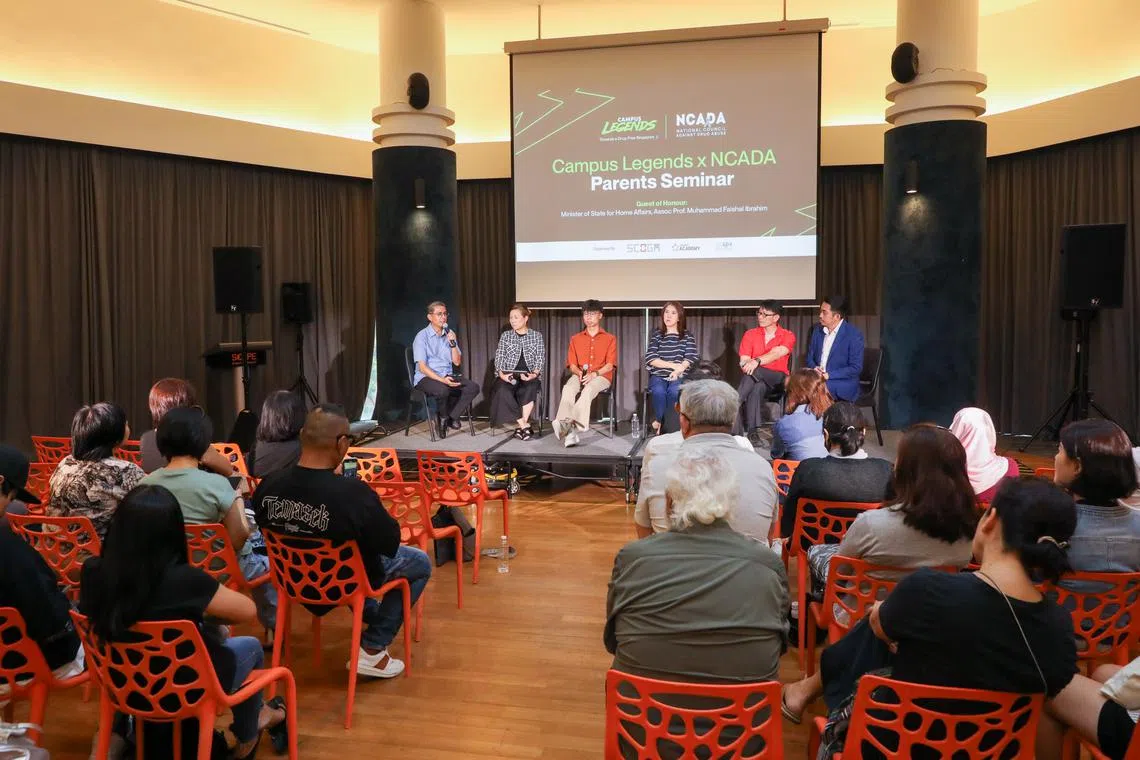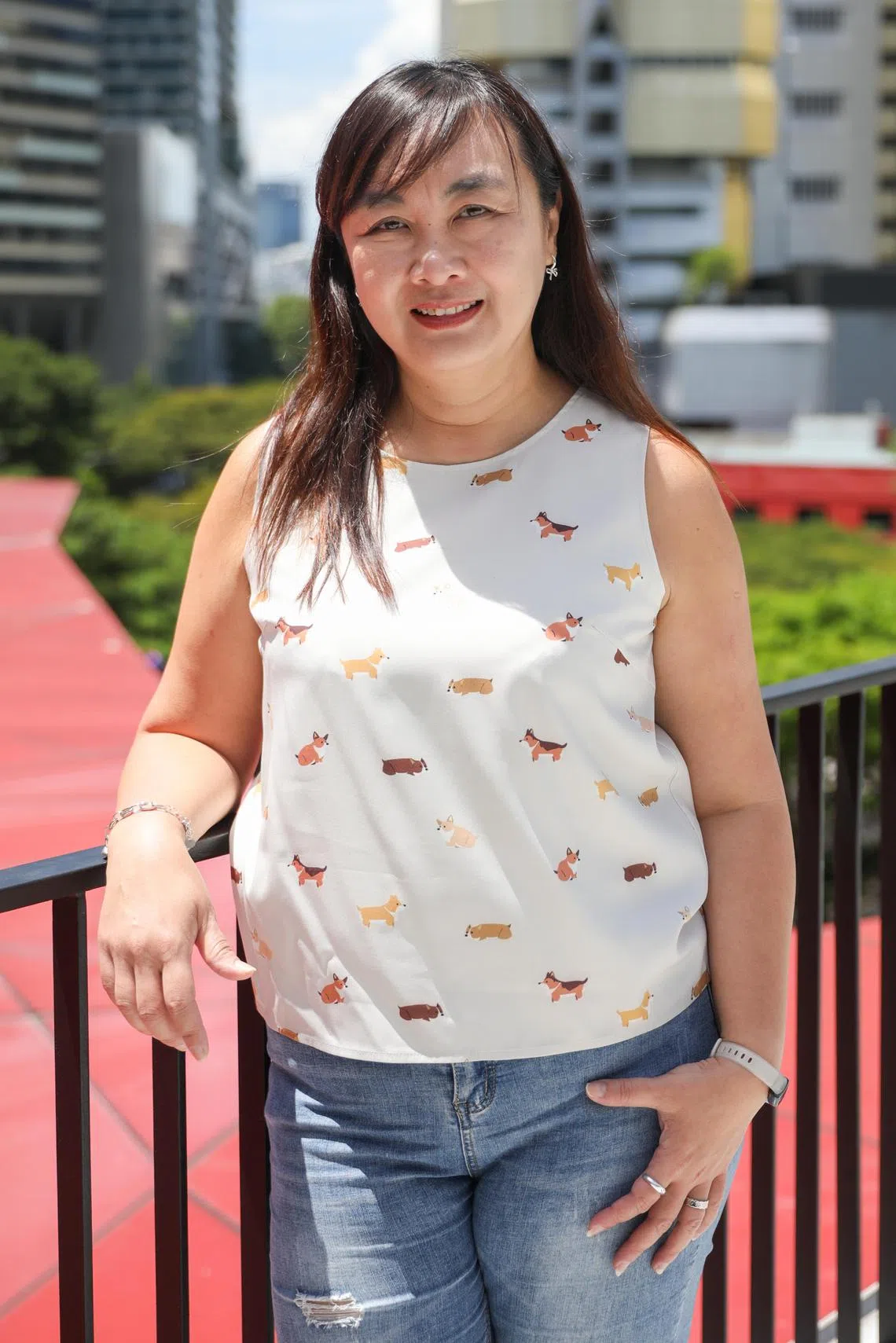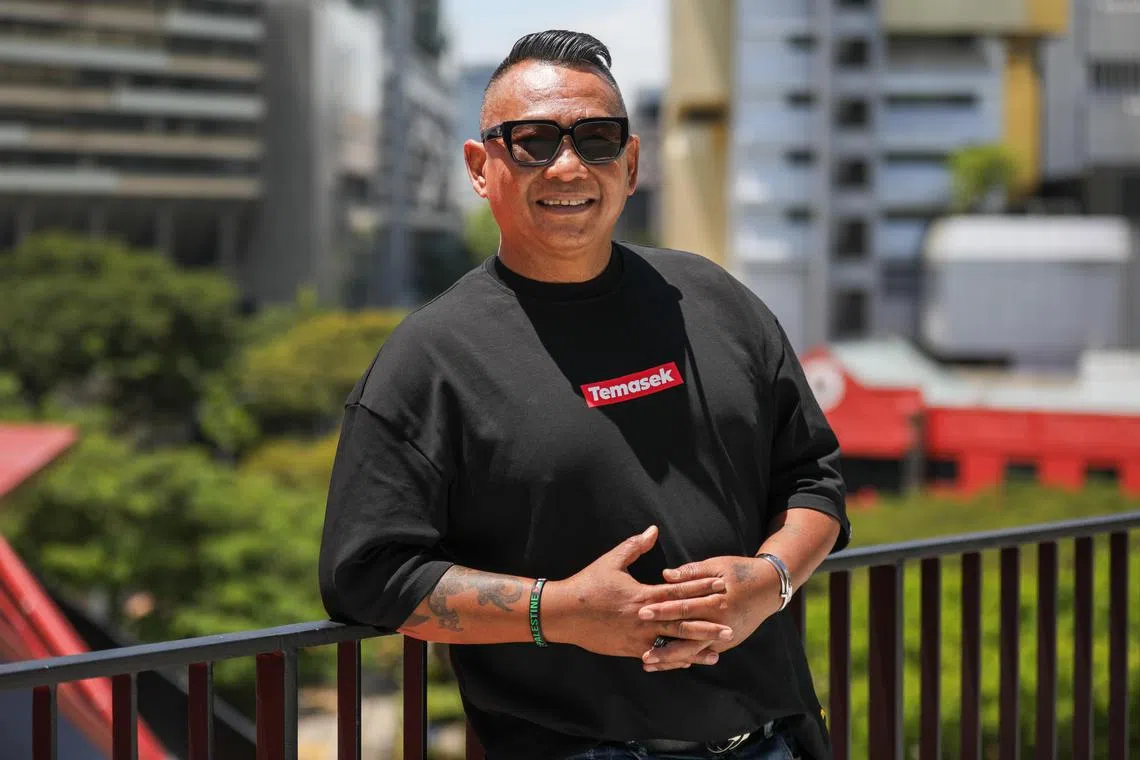More youth in Singapore personally know someone who has taken drugs: Survey
Sign up now: Get ST's newsletters delivered to your inbox

Minister of State for Home Affairs and National Development Muhammad Faishal Ibrahim (left) with panellists at a seminar for parents on the harms of drug abuse on Aug 3.
ST PHOTO: LUTHER LAU
Follow topic:
SINGAPORE – More young people in Singapore personally know someone who had taken drugs, a survey by the National Council Against Drug Abuse (NCADA) shows.
This was revealed in the survey in 2023 whose participants included 3,000 youth aged 13 to 29, with 18 per cent of them reporting that they knew someone who had taken drugs.
This was up from 10.6 per cent in a previous iteration of the survey in 2019.
Minister of State for Home Affairs and National Development Muhammad Faishal Ibrahim cited these figures at a seminar on Aug 3 at *Scape for parents on the harms of drug abuse.
The survey also involved 1,500 adults aged 30 and above.
The survey, which came amid an increase in young drug abusers in Singapore, also revealed more permissive attitudes towards drugs among youth, Associate Professor Faishal said in his opening address.
Some 90 per cent of youth in the survey agreed that drug consumption should remain illegal in Singapore, compared with 96 per cent for adults, he added.
“More worryingly, among secondary school students, only 60 per cent of them agreed that drugs are more harmful than tobacco, despite scientific evidence incontrovertibly showing this,” Prof Faishal said.
He added that there is some concern over youth drug abuse. From 2022 to 2023, the number of abusers here aged below 20 rose by 11 per cent.
Drug abuse can start at a very young age, he noted, as shown in the Health and Lifestyle Survey conducted by the Institute of Mental Health (IMH) in 2022.
Prof Faishal said: “This year, the Central Narcotics Bureau even arrested two 13-year-old abusers. My fear is that we will find more young abusers if we don’t deal with this issue decisively.”
Parents play a key role as they are at the front line to educate youth on the harms of drugs, he added.
Ninety-five per cent of the youth in the NCADA survey agreed that their parents or family members would not approve of them trying drugs. And 91 per cent of those whose parents had spoken to them about drugs said this deterred them from consumption.
“If you look at a survey that we have done, many of our young people consume drugs at home or at their friends’ home. For many parents, they are not aware,” Prof Faishal said. He noted that if parents do not start these conversations at home, their children would discuss these topics with their peers.
“The perceptions held by youth could be fanned by online misinformation, which may lead youth to think that drugs are not that dangerous. Many young abusers have told us that they tried drugs out of curiosity, thinking that they can stop if they want to. But the reality is that once you start, it is very difficult to stop,” he added.
One of the panellists at the seminar, Dr Jimmy Lee, psychiatrist and senior consultant with the IMH, said parents should avail themselves to their children through open conversations so that they can find out how their children are coping.
The associate professor at the Lee Kong Chian School of Medicine at Nanyang Technological University said: “We should avoid approaching the topic in a confrontational, accusatory and agitated manner as it tends to rile emotions, get the child defensive and escalate matters.”
Another panellist, Mr Isaac Goh, a 27-year-old co-founder of a private fitness centre, said: “One thing that helped me see my parents as human, not just a father or mother, is how they shared their past stories and hurts, and asked me if I have been experiencing any challenges.”
The former drug addict is also a community leader with the eX-Offenders For Good movement, a ground-up initiative.
Mrs Siew Fen, 54, a civil servant, told The Straits Times that her 22-year-old daughter’s friends from a university in Amsterdam smoked cannabis in front of her daughter in August 2023, while she was on an exchange trip there.

Mrs Siew Fen said her daughter’s friends from a university in Amsterdam smoked cannabis in front of her daughter.
ST PHOTO: LUTHER LAU
“There is that temptation to experiment with such drugs, thinking they will not get addicted. It is worrying that such drugs are easily accessible and more common these days,” said the mother of two.
Mr Lezan Ariffin, 57, a former drug addict who is in his fifth year of sobriety and a father of two, said kids these days are easily lured to drugs because they learn about the usage online without their parents’ knowledge. Drug awareness education needs to start earlier from primary school, he added.

Mr Lezan Ariffin said kids these days are easily lured to drugs because they learn about the usage online without their parents’ knowledge.
ST PHOTO: LUTHER LAU
“Parents think that these topics are taboo, but we need to talk to our children in a way that does not scold or blame them, maybe tell a story or use metaphor or analogy to help them understand,” said Mr Ariffin. He is semi-retired and volunteers at anti-drug recovery group Goal Aspiration.
“I can’t be with my children 24/7 so I need to trust them. But just giving them trust is not enough, I need to constantly ask them how they’re managing so they feel comfortable to share with me,” he said.
The seminar, which is the first of its kind for parents, was organised by NCADA.
It featured a second session organised by the National Council on Problem Gambling on how parents can guide their children’s digital awareness on online gaming platforms.

